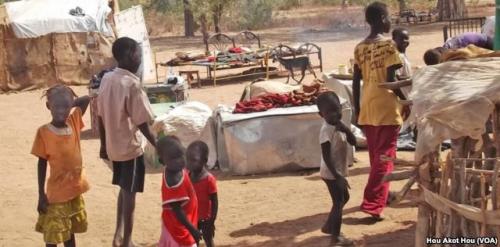After AU Summit Talks, Sudan Peace Still Elusive
Sudanese President Omar al-Bashir on Monday threatened to close a pipeline that carries oil from South Sudan to export terminals in Sudan, dealing a blow to talks held hours earlier with South Sudanese President Salva Kiir at the African Union (AU) summit to iron out differences and move the Sudans toward peace.

The leaders of the two Sudans announced plans at the African Union summit to open four new crossing points along their 2,200-kilometer border.
Speaking on national television after the Sudanese army said it had recaptured a town in the troubled South Kordofan province of Sudan from rebels, Bashir said Sudan would stop carrying crude from landlocked South Sudan as he accused Juba of backing insurgents fighting the government in Khartoum.

Internally displaced persons (IDPs) from Abyei at this makeshift camp in South Sudan want to return to the disputed border region to take part in a referendum in October about the area's status.
Rows between Juba and Khartoum over oil, which is vital to both countries' economies, and backing for rebel group, as well as clashes at the border have kept tensions high between the two Sudans since South Sudan became an independent state in July 2011.
All three issues were among obstacles to lasting peace that were discussed by Kiir ad Bashir when they met on the sidelines of the AU summit in Addis Ababa over the weekend.
On a positive note, the two leaders announced they will open four new crossing points on their 2,200-kilometer (1,370-mile) border to facilitate trade, Sudan's Foreign Minister Ali Karti told reporters in Addis Ababa after the talks.
Kiir pledged during the talks that South Sudan will not support rebels in South Kordofan and Blue Nile states, which remain part of Sudan even though many residents fought against Khartoum during Sudan's long civil war, Karti said.
When the talks turned to oil, Bashir showed Kiir documents that, according to Karti, indicate that Sudan had nothing to do with a temporary shutdown of oil production in the volatile border region. The foreign minister blamed the shutdown on "elements along the border with South Sudan."
The South Sudanese delegation refused to comment to reporters, other than to say the talks had gone well.
Oil is key to both countries' economies. South Sudan gained control of three-quarters of Sudanese crude production when it split from Sudan in July 2011, but oil from the landlocked south has to be transported through pipelines running through Sudan to seaports in the north before it can be exported and generate revenue.
A row with Khartoum, mainly over pipeline transit fees, led to Juba shutting down oil production in January 2012. Production resumed last month.
Stalled Abyei Referendum
Both sides described the talks between Kiir and Bashir at the AU summit as positive, even though the Sudanese leader refused to take up the issue of the disputed region of Abyei when Kiir raised it.
Abyei straddles the border between the two Sudans, and is claimed by both Khartoum and Juba. The province, which is prized for its fertile land and small oil reserves, is currently under United Nations' administration.
An AU panel led by former South African President Thabo Mbeki has proposed holding a referendum in October in Abyei to determine the area's status.
A referendum on whether Abyei was to remain part of Sudan or become part of South Sudan was to have been held in conjunction with the 2011 referendum that gave South Sudan its independence, but that vote was delayed as violence flared in Abyei between ethnic Dinka residents, who are allied with the south, and Arab Misseriya nomads, who have ties to Sudan.
Juba welcomed the AU's proposed October referendum on the region's status but Khartoum has said the vote won't happen because the Misseriya and other nomadic tribes who migrate through Abyei would not be able to vote.
Early this month, the AU called for an urgent meeting of the leaders of the two Sudans to try to find a solution for the flashpoint region after Dinka tribal leader Kuwal Deng Mayok was killed in Abyei by a member of the Misseriya tribe.
Kerry to Name New U.S. Envoy for Sudans
In separate talks at the summit, U.S. Secretary of State John Kerry said he will soon name a special envoy for Sudan and South Sudan to replace Princeton Lyman, who helped negotiate the recent resumption of oil exports from South Sudan through Sudan after a halt of more than a year.
One of the new U.S. envoy's priorities will be to help resolve the status of Abyei, Kerry said.
South Sudanese government spokesperson Barnaba Marial Benjamin said in Juba that the AU should be responsible for solving the continent’s border disputes, including the ongoing disagreement between the Sudans over Abyei.
While Marial held the AU responsible for the Abyei deadlock, Juba University Professor Afred Lokuji laid part of the blame with the South Sudanese government.
Juba should take the lead in the process, he said, pinning the failure to resolve the status of the region on a lack of leadership in South Sudan since independence in 2011.
Source:Voice of America
- 344 reads
Human Rights
Ringing FOWPAL’s Peace Bell for the World:Nobel Peace Prize Laureates’ Visions and Actions

Protecting the World’s Cultural Diversity for a Sustainable Future

The Peace Bell Resonates at the 27th Eurasian Economic Summit

Declaration of World Day of the Power of Hope Endorsed by People in 158 Nations

Puppet Show I International Friendship Day 2020

